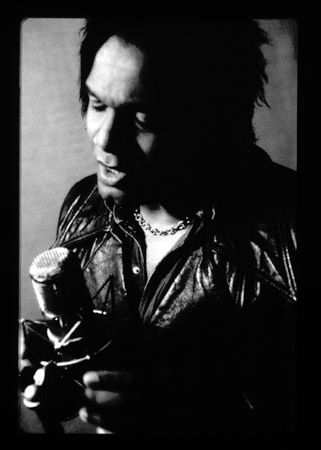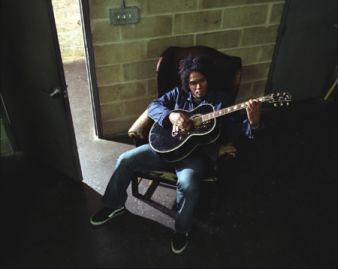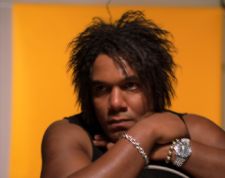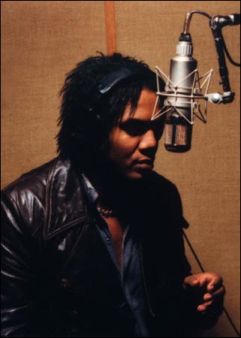|
Part One
Part Two

Jeffrey Gaines is the kind of artist that
inspires absolute allegiance in core fans around the country. To many
others, he is best known as the architect of the definitive cover of
Peter Gabriel's "In Your Eyes." But the real way to experience Jeff
Gaines is live, as captured on his sixth and latest release, "Jeffrey
Gaines Live." We caught up with him after a show at the The Attic
in Newton, and asked him about his influences, his music, and his fans
in Boston.
Boston Beats: State your name, age and
occupation for the record please.
Jeffrey
Gaines: J.G. Jeff Gaines. Old enough, and singer, songwriter.
BB: How did you first get into music?
JG: As a child, I got involved with music immediately. Our
society is riddled with music. Cartoons have music. Kids start singing
jingles that are on commercials and stuff. Educators use music to get
you to memorize the alphabet. Just the very nature of song is in
everything we do. I realized I was interfacing with the music, humming
and singing all the time. And I tend to be pretty good at it. I can pick
out a tune and sing in key. So if you got some aptitude and ability,
then you just start pursuing it.
BB: When did you write your first song?
JG: My first song was written probably about 1985. It was one
long run on sentence, a song called ďFather Time.Ē I was in a band at
the time, and they all went on a dinner break. I had dialed up a pretty
good sound on the guitar and I didnít want to leave it, so I said, ďGo
ahead guys, Iím not even hungry, Iím so into this sound.Ē And for the
first time I was left alone. Being in a band you always have a project
that youíre working on, thereís an objective. But being left alone
there, not really rehearsing, I started just making music, letting it
tell me where it was going to go.
BB: When did you decide that music was going
to be your career?
JG: You find out itís going to be a career when grown men want to
invest in you like a product. Itís weird, youíre just singing in some
club having fun, and thereís a guy in a suit standing in the back of the
club. He comes up with a card and says you should come by his office. So
in a way, the powers that be approach you, and let you know that youíre a
commodity, something they can sell. Thatís how it was for me, anyway. So
Iím in the business, there you have it.
 BB:
Tell me about your songwriting process. How does a new song usually come
about? BB:
Tell me about your songwriting process. How does a new song usually come
about?
JG: Actually itís effort. Once youíre a recording artist, you
have to produce. Writing songs for me now is just a matter of clearing
the space and taking the time. I tend to be a scattered person, and I
distract myself from the work with fun, friends, TV, movies, whatever.
As far as writing songs, you just sort of have to get away from all of
the distractions. So if you get a clear desk, a clean piece of paper,
and a pencil with a sharpened lead youíll write a song. I write songs
because I know that I want to put records out, to make a product to go
to market. It would almost serve no purpose at all to me if it didnít
get it out to the public, or if I didnít play a gig. If I were just
sitting under a tree somewhere, I wouldnít be playing a guitar. I
wouldnít be just playing to the wind or something. I want to play to
public demand. Itís weird because, in a sense, Iím like an actor. I
mean, you deliver the emotion, but youíre thinking about the craft of
selling the emotion.
BB: So what are some of your favorites of
your own songs?
JG: I am really proud of a song called ďA Simple Prayer,Ē on the
record Galore. I just feel good about having a sort of
peace-hippie-folksinger-antiwar song. I was very proud of those lyrics.
BB: For many people, youíre most famous for
your cover of Peter Gabrielís ďIn Your Eyes.Ē What place does that hold
in your career and in your life right now?
JG: I like it because Iím a singer, so itís real easy and fun,
and I got it locked. When it became a hit again in 2001, it was playing
on the radio nationwide. I was going to all these radio stations, and I
had to play it like every morning. Funny jocks in the morning, telling
jokes and talking about celebrities, saying, ďHey, weíve got Jeffrey
Gaines coming by heís brought his guitar.Ē And itís like 7.30 in the
morning, and every morning I just nailed it cold. I sang that fucking
thing so many times, if I didnít love singing it would be a problem. My
audience is completely split in a way, because some people are like,
ďMan, I love that Jeffrey Gaines because he does In Your Eyes,Ē and the person right next
to him rolls their eyes, going, ďI hate that thatís all you talk about.
This guy is so important in my life in so many profound ways, other than
some cover he does.Ē So itís a strange thing for me.
Jeffrey Gaines because he does In Your Eyes,Ē and the person right next
to him rolls their eyes, going, ďI hate that thatís all you talk about.
This guy is so important in my life in so many profound ways, other than
some cover he does.Ē So itís a strange thing for me.
BB: How did that version come
about?
JG: I was seeing a girl, and she liked this record and I was
against it. At the time, I was listening to what I thought was
cutting-edge cool alternative rock, so if it wasnít super punk and super
underground I didnít want to hear it. Peter Gabriel at that time seemed
like one of the monsters of rock, I didnít even want to hear it. So one
day I was driving home from a gig, and this girl was in my lap sleeping
and the song came on the radio. It was so peaceful and she was asleep,
so I knew I wouldnít have to hear, ďOh my god this is the greatest song
ever,Ē and I could just listen and see, alright, what it is about this
song. So then I actually listened to it, driving home from the gig, with
my woman and the sun coming up and no other cars on the road, and Iím
just absorbing it without any hype around it, and I get it, I get it. I
thought, if I turn those words around, and sing it to the audience, and
not make it about one girl or one thing. When I look out at all those
people looking up at me, Iím inspired. That is what keeps me ďawake and
alive.Ē When I turned it into an audience song, it put power behind it
for me.
 BB:
What are your musical influences? BB:
What are your musical influences?
JG: When I was a little kid growing up, my parents played so much
music. Otis Reading, Wilson Pickett. You know, Memphis soul, not really
Motown as much as the deeper south stuff. So itís sort of blues-based,
gospel-based. And Iím a product of the musical time that I got a guitar,
in Ď79. In Ď79 there was Cheap Trick, Kiss, the Cars, stuff like that.
They wrote ďJust What I NeededĒ to be on the radio, to have people turn
it up in their cars and rock to it. Thatís how I look at songwriting.
BB: Whatís your process for
recording music when youíre in the studio?
JG: You know, the process changes throughout your career. When I
write a song I demo it. Itís just me playing the drums, bass and stuff.
Itís really exactly how I feel it, but it might not be up to snuff
performance-wise, because Iím not a drummer. So maybe Iíll get a real
drummer to come in and try to interpret what he hears on my demo. Now he
might take it somewhere else. When youíre working on creating a record,
you allow for things to be collaborated. There are some songs that I
donít like once Iíve recorded them, but generally the only time I really
hate a song is if weíve messed it up in the recording of it.
NEXT SECTION
Part One
Part Two
*Pictures courtesy of
http://www.jeffreygaines.com/
|